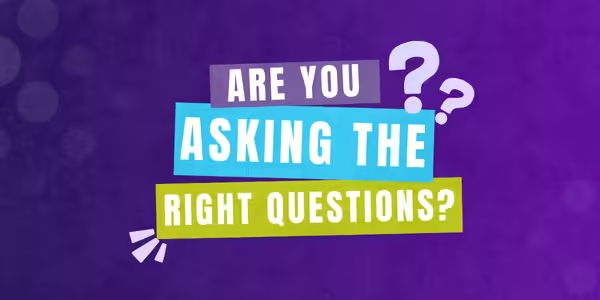Hiring the right person for a role often involves understanding not just what a candidate knows but how they’ve applied that knowledge in real-life situations.
Competency-based and behavioural interviews help to uncover these insights by focusing on past experiences and demonstrated abilities. Below, we explore important competency and behavioural assessment questions to ask during an interview, with examples of strong answers.
What Are Competency-Based and Behavioural Interview Questions?
Competency-based questions assess whether a candidate has the skills, abilities, and knowledge required for the role. These questions often relate directly to the specific competencies outlined in the job description, such as teamwork, leadership, or problem-solving.
On the other hand, behavioural interview questions aim to predict future behaviour by asking candidates to provide examples of how they’ve handled situations in the past.
Why Are These Questions Important?
Both competency and behavioural interview questions provide examples of a candidate’s abilities and fit for a role. Instead of theoretical or hypothetical responses, you learn how the candidate actually approaches challenges, collaborates with others, and solves problems.
Key Competency-Based Interview Questions (with Examples)
Here are some competency-based interview questions, along with sample answers to give you an idea of what to look for:
1. Can you describe a time when you had to work as part of a team to achieve a goal?
This question assesses teamwork, communication, and collaboration skills.
Example Answer: “In my previous role, we had to launch a new product within a tight deadline. I worked closely with the marketing and design teams to ensure that the product positioning was aligned with our customer insights. We set up weekly check-ins to track progress and adjust our approach as needed. By the end of the project, we successfully launched on time and exceeded our initial sales targets by 15%.”
What to Look For:
- Clear communication and collaboration with others
- Ability to manage challenges within the team
- Contribution towards the overall success of the project
2. Tell me about a time when you had to make a difficult decision under pressure.
This question evaluates decision-making, resilience, and problem-solving skills.
Example Answer: “I was working on a critical client project when we encountered a major technical issue that could have delayed the entire timeline. I had to decide whether to halt the project for troubleshooting or proceed with a workaround. After consulting the team, I opted to implement a temporary solution while working on the permanent fix in the background. This allowed us to meet the deadline without sacrificing quality, and we fixed the issue soon after.”
What to Look For:
- Ability to remain calm and logical under pressure
- Confidence in making decisions
- Willingness to consult others and weigh options
3. Can you give an example of when you had to influence others to adopt a new process or idea?
This question gauges leadership, persuasion, and adaptability.
Example Answer: “At my previous job, I noticed that our internal reporting system was outdated and causing delays. I researched alternatives and presented a new system to my manager and colleagues. Some team members were hesitant about the change, so I organised a demo session to show them how it could save time and improve accuracy. After the session, they were on board, and the system was adopted, resulting in a 20% improvement in reporting efficiency.”
What to Look For:
- Initiative in identifying and solving a problem
- Persuasive communication and influence
- Ability to handle resistance to change
Key Behavioural Interview Questions (with Examples)
Here are some top behavioural questions to help you dive deeper into a candidate’s work style and problem-solving abilities:
1. Describe a time when you faced a significant challenge at work. How did you handle it?
This question helps assess a candidate’s problem-solving ability, resilience, and adaptability.
Example Answer: “While managing a project, a key supplier unexpectedly went out of business, which put the entire project at risk. I quickly began researching new suppliers and reached out to my network for recommendations. I managed to secure a new supplier within a week, negotiated favourable terms, and adjusted our timeline slightly to accommodate the change. Despite the disruption, we delivered the project on time and within budget.”
What to Look For:
- Proactive approach to problem-solving
- Ability to pivot quickly and find solutions
- Maintaining project goals despite challenges
2. Tell me about a time when you received feedback that you didn’t agree with. How did you respond?
This question evaluates emotional intelligence, openness to feedback, and communication skills.
Example Answer: “During a performance review, I was told that I needed to improve my delegation skills. Initially, I didn’t agree, as I felt I was managing my workload well. However, after reflecting on the feedback, I realised that I was taking on too much myself, which wasn’t allowing my team to grow. I made a conscious effort to delegate more and support my team in developing their own skills. As a result, we became more efficient and achieved better results as a team.”
What to Look For:
- Ability to accept and reflect on feedback
- Willingness to change behaviour for the benefit of the team
- Growth and development following feedback
3. Give me an example of how you prioritised multiple tasks with competing deadlines.
This question is key for assessing organisational and time management skills.
Example Answer: “In my last role, I was managing three projects simultaneously, each with tight deadlines. I started by assessing the importance and urgency of each task, then communicated with the project stakeholders to ensure they were aware of my plan. I broke down the projects into smaller, manageable tasks and allocated time slots to each. By staying organised and communicating regularly with the teams, I was able to meet all deadlines without compromising on quality.”
What to Look For:
- Strong organisational skills and ability to manage time effectively
- Communication with stakeholders
- Clear prioritisation and delegation where necessary
Final Thoughts
Competency-based and behavioural interview questions are valuable tools to gain a deeper understanding of a candidate’s abilities, work style, and potential fit within your organisation. By asking these targeted questions and analysing the candidate’s responses, you can make more informed hiring decisions based on demonstrated skills and behaviour, rather than gut feelings or first impressions.
When using these types of questions, remember to look not just at what the candidate achieved, but how they went about it. This approach will help ensure you’re choosing candidates who are truly capable of succeeding in the role, not just those who sound good on paper.
For more useful articles and guides, head to our insights page.




